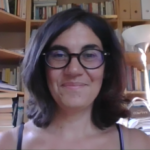 Sara Trovato earned her PhD in Philosophie et Lettres in 2000 from Université Catholique de Louvain.
Sara Trovato earned her PhD in Philosophie et Lettres in 2000 from Université Catholique de Louvain.
She has worked in various Italian universities teaching Didactics for Deaf students, Sociology of Education, Italian Literature, General Sociology, Methodology of Sociological Research, Political Philosophy.
She has published both theoretical and empirical papers dedicated to the right to Sign Languages, deaf children in kindergarten, and the educational and social condition of Deaf people.
In the domain of education for Deaf students, she coordinated and co-authored Corso di italiano per chi non sente (e per i suoi compagni udenti) (2013, Milano: Raffaello Cortina), the first book of Italian for deaf students over 11 years of age. She also published Insegno in segni. Linguaggio, cognizione, successo scolastico per gli studenti sordi. (2014, Milano: Raffaello Cortina), a work intended for teachers and professionals working with Deaf teen-agers.
In the domain of Sign language teaching, she has coordinated and co-authored Insegnare e imparare la LIS. Attività e materiali per il docente, lo studente e l’autoapprendimento (2020, Trento: Erickson).
She presently teaches Italian language at Istituto Italiano di Cultura in Paris.